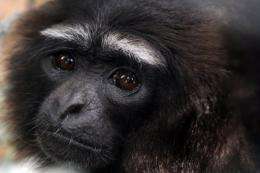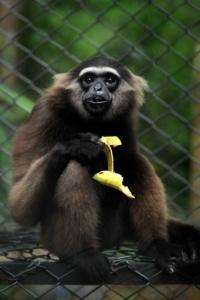French crusader for gibbons in Borneo jungle

For 15 years Aurelien Brule has lived in the Indonesian jungle, crusading against palm oil multinationals, loggers and corruption in his bid to save endangered gibbons from annihilation.
He admits that his is a losing battle. The primates are being pushed out of their natural habitat by loggers removing the equivalent of six football fields-worth of jungle "every minute" to make way for palm oil plantations.
Around 100,000 gibbons remain in the forests of Borneo, but there will be few left within the next 15-20 years according to Brule with up to 1.5 million hectares of jungle lost every year, despite the efforts of conservationists.
For Brule, who has since changed his name to "Chanee" -- meaning "Gibbon" in Thai -- it is a struggle that he was probably destined for.
As a 12 year-old, he spent so much time observing gibbons at a zoo in his hometown of Frejus in southern France the local press dubbed him "the little strange kid who watches monkeys instead of playing video games."
Four years later the teenager published his own encyclopaedia on the critically endangered primates, whose distinctive faces are framed by a ring of white fur.
In the media, he talked about his dream of moving to Asia and working to help protect endangered gibbons, which brought the attention of French actress and comedian Muriel Robin who one day called him up and gave him the funds to move to Indonesia.
Sometimes called the "French Dian Fossey" -- the American zoologist who dedicated her life to preserving African gorillas until her murder in 1985 -- Brule, 33, has set up a sanctuary, and a radio station that helps listeners report gibbons held in captivity.
Chanee arrived in Indonesia in 1998 at the age of 18, flying to the island of Borneo and spending the next three months climbing through jungle to reach the tribal lands of the Dayak native people, where Borneo's gibbons dwell.

Aiming to build a sanctuary in those tropical forests, he spent the next few months immersed in Jakarta and the intricacies of its Kafkaesque bureaucracy to seek permission to build it.
For nine months he pestered authorities until in September 1999 he got what he went for, and returned to the forest to build the sanctuary named "Kalaweit", which in the Dayak language means "gibbon".
Over the years the Kalaweit sanctuary has grown into what he calls "the largest program for the rehabilitation of gibbons in the world" with more than 250 animals, 50 employees and an annual budget of 400,000 euros ($491,000) from private donations.
Yet, for Chanee, "this is not a success but a failure". He has not fully realised his boyhood dream of returning gibbons released from cages back to the wild.
Gibbons cannot be returned alone to the wild because they would be killed by pairs protecting their own territory. But rampant deforestation has wiped out "empty" forest sites suitable for single gibbons, meaning that the majority of those recovered by the sanctuary have nowhere to go.
Large tracts of Indonesia's jungle have been cleared for palm oil plantations due to surging global demand, one of the main reasons Indonesia is the third biggest emitter of greenhouse gases behind the US and China.
Indonesia has implemented a two-year moratorium on issuing new logging concessions on peatland and in other high-conservation forests.

But unsustainable logging continues with concessions still given in forests deemed not to be "high-conservation" allowing corrupted officials to draw their own map of primary forests that should be protected.
Chanee said that he soon realised that if he was to help save gibbons, he would have to expand his work to fight deforestation. In 2003, Kalaweit bought 100 hectares (247 acres) for a reservation.
In August the organisation will receive a motorised paraglider that will enable staff to photograph illegal logging.
But standing up to palm oil giants is a David-and-Goliath fight that is not risk free.
In 2009, Chanee and his Indonesian wife Prada were attacked by loggers who, while raining blows down on them, told him "get lost boule" -- meaning "white" man in Indonesian.
A guard has been stationed outside the house the couple share with their two sons, two-year-old Enzo and Andrew, eight, ever since.
Chanee said he recognised that the risks from his work are real.
"But it's a risk one has to take, because nothing comes from nothing".
(c) 2012 AFP



















